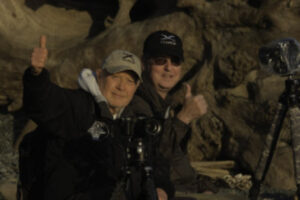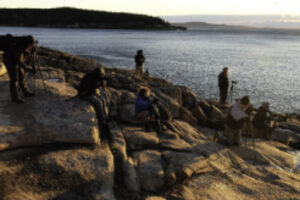About My Photo Workshops …
One of the greatest joys I have in being a workshop leader is to teach both the technical and creative aspects of photography to my attendees. Spending time in the field, or in the classroom, sharing my experience and knowledge with others and watching them try and apply new skills or insights with pleasing results is the best satisfaction I can ask for.
By attending a workshop you show that you are serious about your photography and my belief is that you want to grow your knowledge, skills and abilities to become a better photographer and helping you grow is my main goal during our time together.
Learning how to “see” creatively, learning how to approach a new location/scene, learning how to use your camera to achieve the creative results you envision … those are all things we will work on during my workshop. I will spend as much, or as little, time with you as you want, I won’t force you to learn. Just know that I’m available and willing to share all of my knowledge and experience to help you grow as an artist.
I would ask that when you attend one of my workshops that you come with an open mind and willingness to learn and try new things, perhaps pushing your comfort zone out a little bit. I believe that we never stop learning our craft and our growth as artists come through a willingness and desire to learn.
By the end of the workshop, my goal is for you to leave with more knowledge and skills than when you arrived (plus some great images and great memories!). If that happens, I feel successful and all the hard work to conduct the workshop will have paid off.
After the workshop ends, our time together doesn’t have to end. I can be available to you to answer questions, critique images or just stay connected with a chat.
If you have any questions about my workshops or teaching, please don’t hesitate to reach out to me.
Hope to see you soon!!!!
John Pedersen
FAQ’s
Why Take a Workshop From Us?
Our workshops offer you an unmatched experience and level of attention. In our almost 30 years of conduction in the field photography workshops, 
Many of our customers are repeat attendees and some have been with us many, many times. Many of them are available in the event you would like to talk with them about their experiences. Just let us know. Jack wrote an article about workshops on his blog called “Choosing the Right Workshop. It is a “Jungle out There.” Please read it HERE
Our workshops obey all rules and regulations. We always have the proper permits and insurance to operate our workshops. Often, we may ask a landowner for permission to photograph on their property. We are respectful of all natural entities and others during our workshops. We adhere to the “leave no trace” principle.

John Pedersen Photography LLC is incorporated in the State of Washington. We carry all proper permits and insurance. We are current in First Aid training and certifications.
We offer refunds with confines. Please read our Terms and Conditions page for more information. All deposits are held for the specific workshop you register for, and we do not spend deposit monies prior to the completion of the workshop. In all our years, we have established this practice and are proud of never disappointing a client. We never have access to your credit card information unless you give it to us verbally.
We do not offer meals and lodging on our workshops. Why? In some cases, other workshops build in extra profit in the lodging and food when they include them in the cost. In some cases, you may not want to stay in the hotel we are using as a base of operations. You are entitled to this. You may want to skip a meal. Why pay for something you do not use? We do not function as a travel agency, but we recommend hotels and food establishments for your consideration.
Workshop Size
We keep our workshops at or below a 5-6 to 1 attendee to instructor level. This insures quality and personalized time with each attendee both in the field and in our classroom. Larger groups will limit your experience.
Skill level
Our workshops typically range from amateurs to advanced amateurs. We’ve even had other professional photographers on our workshops. Every workshop is different in some respects as far as location accessibility. We will inform you of any difficulties that are involved—there will be no surprises. We stay safe and don’t get involved in areas that are questionable. However some areas require a bit more hiking than others.
Attendees should have a good understanding of their equipment, cameras and menus, as well as the relationship between aperture, shutter speed and ISO. We send out information on this subject as well as other specific things that will make your over experience a good one. You will be prepared ! A laptop and a thumb drive will be very handy for preparing images for review as well as backing up your work.
Equipment
We are not here to promote equipment. You brand of choice is of no matter to us. This includes mobile phones that take some amazing images these days. Our basic philosophy is that if your images are not up to your standards, it’s not the gear. We’ll do our best to correct that.
Hotel information
We will provide hotel and location information, as well as suggested clothing and equipment, to all workshop attendees upon registration.
Itinerary and travel information
Specific photography shoot locations and timetables are not set until shortly before our workshop so that we can assess last minute weather and light conditions. You will receive a detailed itinerary upon arrival.
Workshop updates and other information
About a month before our workshop you will begin to receive information regarding what to bring, clothing, equipment and weather. Final updates will go out a week before. We tend to over inform you so that you are totally prepared.
A typical day
- Pre-sunrise departure from our hotels. It’s a good idea to pick up some snacks (granola bars etc.) the night before. Please let us know if you have any food allergies or requirements.
- Unless indicated when we meet at the beginning of our workshop, we will return to town late morning and eat lunch. Please note that if you decide to stay out in the field and skip lunch (not suggested!) it is your responsibility to arrive on time at the location for our afternoon session.
- Time will be devoted to image reviews as well as presentations of photographic interest.
- We may elect to stay longer in the field one day and save the review/discussion session for another time. We are very flexible.
- Depending on weather and location, our time in the field often continues through sunset, taking advantage of the day’s golden hours. Again, it’s a good idea to carry snacks as dinner could be at a late hour.
- It is very important that you are prompt for departures and for situations that call for attention to time. I highly suggest that you try to be ready 10 minutes before the times we determine, just in case.
What do we cover in the field and classroom?
We stress the “Why” of things along with the “How To” of photography. Every image should tell a story and convey emotion. When we use our eyes and inner emotion together, we have the potential to make a powerful image. In the field we emphasize slowing down, defining the subject and deciding how to tell the story using your camera. We will work on “seeing” images and using the environment to aid in creating artistic imagery. We will discuss the need for foregrounds, leading lines or patterns and how to handle these in different ways. We will stress simplicity and use all aspects, including depth of field, proper exposure, filter usage and more. All this will help you become a better “thinking” photographer and at the same time, return home with some wonderful images from unforgettable locations. The following (and not in any order) are just some of the many things we will bring attention to during our time together.
- Improving your technical and visionary photographic skills within these “hands-on” workshops
- Developing your skills in finding, seeing and creating your image
- Making images that allow the viewer to quickly define the subject and understand the story you are trying to convey
- Working the scene and area, not just making a photograph and moving to the next possible location
- Composition, exposure and other essential elements needed to bring out the story within the image
- Other techniques including, learning about when or when not to use strong tonalities, negative space, balance, framing, bringing out your personal vision and eliminating any flaws that negatively affect your images
- Choosing the right focal length (lens) to convey your story
- Learning to think about how you want your image to look while in the field, not after the fact
- We will discuss how to make panoramas and long exposures, and how to use focus stacking and HDR effectively
- Basic processing, workflow, how to use available programs (Adobe) as well as other software (NIK software etc.), together
The majority of instruction, nature photography techniques and tips take place right there in the field. We take time in the evenings and periodically during the day to review our images in informal critique sessions. We also make special presentations concerning nature photography from time to time. There’s no need to take notes; after the workshop you’ll receive a complete 80+ page syllabus containing everything we discussed and more.
